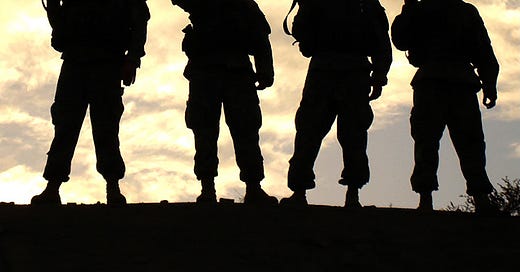SIGNALS OF STRENGTH: 10 Actions to Reassert American Military Dominance and Warrior Culture

As we usher in a new era of military leadership with the swearing-in of Secretary of Defense Pete Hegseth, we are presented with a narrow but significant opportunity to trigger a fundamental shift within our armed forces.
Hegseth’s appointment marks a clear break from the status quo, and he understands that decisive and bold actions are needed to restore a warrior culture that emphasizes readiness, accountability, and lethality.
To forward this vision, the following 10 actions could help clearly demonstrate to our troops, allies, and adversaries that a strong warrior ethos is once again guiding the American military.
Readiness is the Only Priority
All military services must declare “Readiness” as their exclusive priority, with no other priorities allowed, to ensure leadership is focused on preparing to fight at all levels of conflict without distraction.Unity is Our Strength
Instruct all senior leaders and communicators to immediately shift the message from “Diversity is our Strength” in favor of “Unity is our Strength,” as reflected in our national motto, “E Pluribus Unum.”Establish an Elite “Border Brigade”
Activate a brigade of the 1st Cavalry Division at Fort Cavazos, Texas, with specialized cavalry squadrons trained and equipped to support border security operations — supported by dedicated aviation, engineering, medical, support, and transportation battalions — capable of surging to critical areas when and where needed.Launch a Joint Recruiting Campaign Based on “American Warfighters”
Financial incentives like job training, college money, and health care coverage don’t inspire true warriors to enlist; we must appeal to a sense of duty, honor, exclusivity, and strength. By emphasizing the need for warfighters, we can attract dedicated Americans ready to embrace the role of protector and champion for our nation.Apology to SFC Pentland
Officially apologize to SFC Jonathan Pentland for the Army hanging him out to dry after the 2020 incident at Fort Jackson, South Carolina, to communicate that leadership should back their troops when they are treated unjustly.Move Away from Elite Institutions and Soft Studies
Sending officers to Ivy League schools to study subjects like international relations disconnects them from their troops and their purpose; priority will be given to learning vital warfare fundamentals, such as logistics and manufacturing, and at state schools to foster closer connections with a more diverse and service-oriented community.Officially Define “Diversity”
Define “diversity” in Joint Publication 1-02, the Department of Defense Dictionary of Military and Associated Terms, as a concept centered around different experiences and perspectives, not identities.Consider Logisticians for Combatant Commander Assignments
Amateurs talk strategy, while professionals talk logistics. Therefore, generals and admirals from the sustainment community should be carefully considered for combatant commander assignments, as theater-level command inherently focuses more on complex logistics than on operational strategy. We need commanders who think like warfighters, not like ambassadors.Require Signatures to Classify Documents
Widespread overuse of classifications clouds transparency and obstructs accountability; requiring an electronic signature to classify a document would encourage thoughtful decision-making instead of a “Classify Everything” approach.Everyone is a Rifleman
The most dangerous weapon in the world is an American with a rifle; therefore, all servicemembers and Department of Defense civilians who qualify as Expert on the 1903 U.S. Army Qualification Course annually will earn the Rifleman’s patch and receive incentive pay.
As Secretary Hegseth embarks on what he calls the “most important deployment of my life,” and as his team assembles and prepares to deliver on President Donald Trump’s vision, it’s critical that we consider these and other unconventional proposals.
Remember, when we used to win wars, it was because our nimble, creative, and adaptive military fought against top-heavy armies mired in bureaucratic processes and archaic traditions
And when we've lost, it’s been because that equation was flipped.
It’s time to flip it back.
(J. Pepper Bryars is a veteran and the author of “American Warfighter: Brotherhood, Survival, and Uncommon Valor in Iraq, 2003-2011.”)



